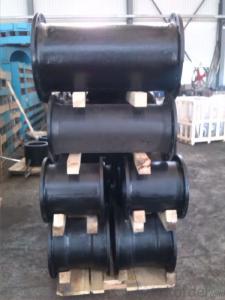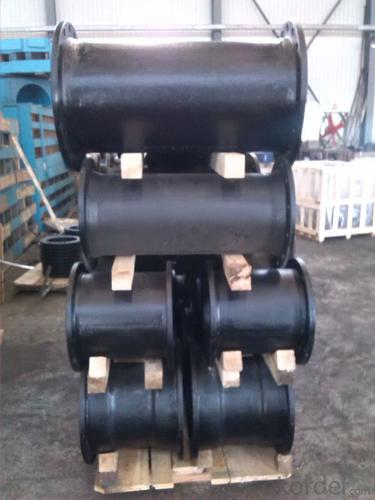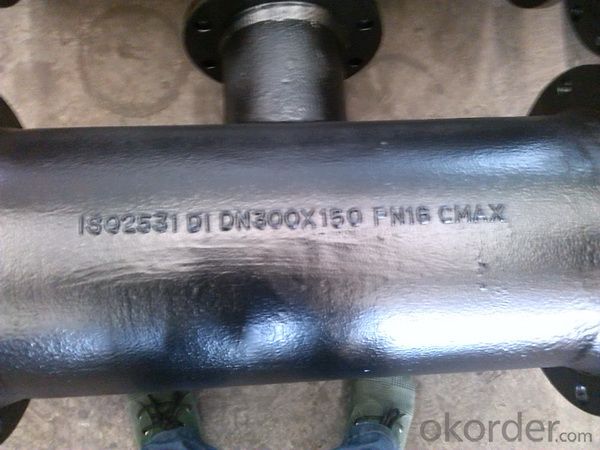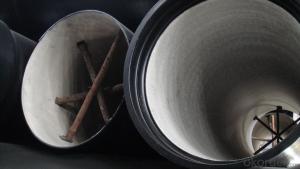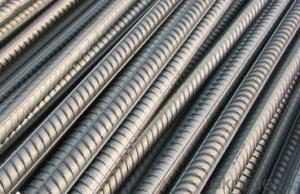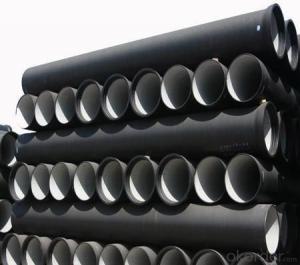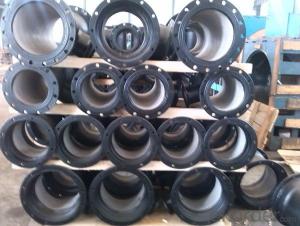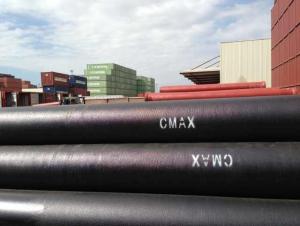DUCTILE IRON PIPE DN600 K12
- Loading Port:
- Tianjin
- Payment Terms:
- TT OR LC
- Min Order Qty:
- -
- Supply Capability:
- 30000Tons m/month
OKorder Service Pledge
OKorder Financial Service
You Might Also Like
CNBM ductile iron pipe ranges from DN80-DN1600mm (T-Type, Class K9), effective length 6m, comply with ISO2531 Standard
Company Profile
CNBM International Corporation is the leading production base and renowned supplier of Ductile Iron Water Pipe systems of both potable and waste water in China. We are constantly looking to develop high quality products to ensure the longest service life and wonderful performance.
CNBM Pipelines regard quality as the essential factor leading to successful business. Every pipe is tested in accordance with BS EN545 (water application) or BS EN598 (sewer application). CNBM Pipelines products comply with and are tested according to the relevant European and International Standards. Our pipes are manufactured under the quality management system BS EN ISO 9001. After years of efforts, CNBM Pipelines has built up great reputation in terms of quality and service among customers worldwide
Product Introduction
CNBM ductile iron pipe ranges from DN80-DN1600mm (Tyton, T-Type, Class K7/K8/K9), effective length: 6m, complying with BS EN545/EN598/ISO2531/BS4772.
Specification& Payment terms
Internal lining: Pipes shall have an internal cement mortar lining in acc with ISO4179.
External coating: Pipes shall be externally coated with metallic zinc spray plus a further layer of resin painting to ISO8179.
Gasket: 100% SBR/NBR/EPDM gasket in accordance with ISO4633.
Packing: Pipes from DN100 to DN300 be bundled with steel belts, the others are in bulk.
Payment term: By 30% T/T advance payment + 70% Irrevocable L/C at sight.
Packing: In bulk vessel or in container.
- Q: How do ductile iron pipes perform in sandy soil conditions?
- Ductile iron pipes perform well in sandy soil conditions due to their inherent strength and durability. The material's high tensile strength allows it to withstand the pressure exerted by the surrounding soil, preventing pipe deformation and breakage. Additionally, the corrosion resistance of ductile iron ensures a longer lifespan, even in corrosive sandy soil environments.
- Q: How is ductile iron pipe installed?
- Ductile iron pipe is typically installed using a process called trenchless technology or open-cut method. In the trenchless technology approach, a hole is drilled into the ground and the ductile iron pipe is then pushed or pulled into the hole using hydraulic jacks or winches. This method minimizes disruptions to the surrounding environment and reduces the need for extensive excavation. In the open-cut method, a trench is excavated to the required depth and width for the ductile iron pipe. The trench is then prepared by removing any debris or obstructions and ensuring a stable base. The pipe is then lowered into the trench and aligned properly using laser or surveying equipment. After the pipe is positioned, joints are connected using a rubber gasket or mechanical joint. The joints are typically sealed to prevent leakage. Backfill material is then carefully placed around the pipe, ensuring proper compaction to provide stability and support. The backfill is typically done in layers to avoid excessive settlement. Once the installation is complete, the pipe is tested for leaks and pressure to ensure its integrity. This may involve hydrostatic testing, where the pipe is filled with water and monitored for any signs of leakage or pressure loss. Overall, the installation of ductile iron pipe requires careful planning, excavation, alignment, joint connection, backfilling, and testing. It is essential to follow industry standards and guidelines to ensure a successful and reliable installation that meets the required specifications.
- Q: How much water seepage is allowed in the water pressure test for water hose DN300?
- For water polo hose DN300, hydraulic pressure test allows water penetration to be 17.60 m3 / (24h km).The water pressure test of the indoor water supply pipeline must meet the design requirements. When the design is not specified, the test pressure of all kinds of material supply piping system is 1.5 times of the work pressure, but not less than 0.6MPa.
- Q: How much is the installation of cast iron pipe drainage 1 meters?
- From the tightness and corrosion resistance, ductile pipe sealing better after installation, but also can improve the corrosion resistance of corrosion protection through a variety of means; from the hydraulic performance, because ductile pipe specifications generally refers to the inner diameter of PE pipe diameter specifications generally refers to the same specifications, because under the condition of ductile pipe can achieve more runoff large; from the installation and maintenance cost, ductile pipe have more favorable price. The inner wall of zinc spray, anti-corrosion materials such as cement mortar.
- Q: Can ductile iron pipe be used for irrigation systems?
- Yes, ductile iron pipe can be used for irrigation systems. Ductile iron is a strong and durable material that can withstand the high pressure and constant flow of water required for irrigation systems. It is resistant to corrosion, making it suitable for underground applications where it may come into contact with moisture and soil. Additionally, ductile iron pipes have the advantage of being able to handle heavy loads, which is important for irrigation systems that may require the use of heavy machinery or vehicles. Overall, ductile iron pipe is a reliable and long-lasting choice for irrigation systems.
- Q: Are ductile iron pipes suitable for use in hydropower projects?
- Yes, ductile iron pipes are suitable for use in hydropower projects. Ductile iron pipes are known for their strength, durability, and resistance to corrosion, making them ideal for carrying water in hydropower projects. Additionally, their ability to withstand high pressure and adaptability to various ground conditions further supports their suitability for such projects.
- Q: Can ductile iron pipe be used for pump stations?
- Yes, ductile iron pipe can be used for pump stations. Ductile iron pipe is a commonly used material for underground water and wastewater systems, including pump stations. It offers several advantages such as high strength, durability, and corrosion resistance, making it suitable for such applications. Additionally, ductile iron pipe is compatible with various types of pumps and is known for its long service life, making it an ideal choice for pump station projects.
- Q: Ductile iron pipe connection mode
- The connection mode of ductile iron pipe installation program: clean up the socket socket to clean up on the apron, apron, pipe (tube), Jack in appearance and rubber brush lubricant to push the pipe into socket to check.
- Q: Can ductile iron pipes be used for gas distribution systems?
- Yes, ductile iron pipes can be used for gas distribution systems. Ductile iron pipes are known for their strength and durability, making them suitable for carrying various types of fluids, including natural gas. These pipes have excellent corrosion resistance and can withstand the high pressure and stress typically associated with gas distribution systems. Additionally, ductile iron pipes are cost-effective and have a long lifespan, making them a reliable choice for gas distribution networks.
- Q: What is the expected flow capacity of ductile iron pipes?
- The expected flow capacity of ductile iron pipes can vary depending on various factors such as pipe diameter, length, internal roughness, and hydraulic gradient. However, generally speaking, ductile iron pipes have a high flow capacity due to their smooth internal surface and sturdy construction. They are capable of handling substantial volumes of water or other fluids efficiently and reliably.
Send your message to us
DUCTILE IRON PIPE DN600 K12
- Loading Port:
- Tianjin
- Payment Terms:
- TT OR LC
- Min Order Qty:
- -
- Supply Capability:
- 30000Tons m/month
OKorder Service Pledge
OKorder Financial Service
Similar products
Hot products
Hot Searches
Related keywords
